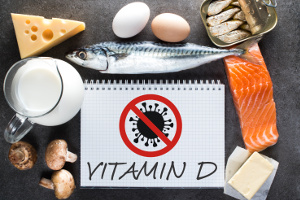New study: 80 percent of hospitalized COVID-19 patients lack vitamin D
 Vitamin D is vital for a well-functioning immune defense, yet a stunning 80 percent of patients hospitalized with COVID-19 lack the nutrient, according to a study published in The Journal of Clinical Endocrinology & Metabolism. Earlier research has shown that having too little vitamin D in your system increases the risk of life-threatening complications. It is also a well-known fact that vitamin D deficiency is a problem that is more widespread during the winter period, especially among exposed groups like seniors, nursing home residents, chronically ill, and dark-skinned people.
Vitamin D is vital for a well-functioning immune defense, yet a stunning 80 percent of patients hospitalized with COVID-19 lack the nutrient, according to a study published in The Journal of Clinical Endocrinology & Metabolism. Earlier research has shown that having too little vitamin D in your system increases the risk of life-threatening complications. It is also a well-known fact that vitamin D deficiency is a problem that is more widespread during the winter period, especially among exposed groups like seniors, nursing home residents, chronically ill, and dark-skinned people.
Because the sun is our main source of vitamin D, factors like spending too much time indoors combined with sun awareness campaigns have resulted in widespread and worldwide vitamin D deficiency. At northern latitudes, the problem is even more pronounced during the winter period where the sun is too weak for us to be able to produce vitamin D. Seniors, nursing home residents, people of color, overweight individuals, diabetics, cancer patients, and others with chronic conditions risk permanent vitamin D-deficiency because they have difficulty with synthesizing and utilizing the nutrient. This makes these groups more vulnerable to viral infections such as COVID-19. Even in Spain, vitamin D deficiency is common and many potentially life-threatening cases of COVID-19 are observed here, according to the new study.
|
Vitamin D supports the immune system in several different ways
Vitamin D is considered a steroid hormone. It has an overlooked role in the innate and the adaptive immune systems, which since the beginning of time have been designed to defeat millions of different microorganisms.
Vitamin D controls the production of antibiotic peptides in the respiratory system. It also helps activate a certain type of white blood cells called T cells so they can replicate explosively and carry out frontal attacks on virus and bacteria. Vitamin D also controls on-off switches in 5-10 percent of our genes, including ones that are found in our immune system. That way, vitamin D helps the immune system direct its attacks accurately without overreacting. This is a highly important function because when COVID-19 runs off the rails, it is an overactive immune reaction that causes cytokine storm and hyperinflammation, resulting in acute respiratory distress syndrome (ARDS) and secondary damage to the cardiovascular system and other tissues. This can be life-threatening. The key to a successful defense is an effective immune system that can attack swiftly and directly without causing damage to the surrounding healthy tissue.
80 percent of hospitalized COVID19 patients lack vitamin D
Numerous studies show that vitamin D is vital for the immune system and that a deficiency increases the risk of infection and complications. It was on behalf of these existing studies that scientists from University of Cantabria in Spain wanted to compare blood levels of vitamin D in 216 hospitalized COVID-19 patients and a group of healthy controls. The scientists also wanted to take a closer look at any connection between blood levels of vitamin D and COVID-19 severity and mortality.
They observed that 88.2 percent of the hospitalized COVID-19 patients lacked vitamin D. In the control group, 47 percent of the subjects were vitamin D-deficient, which shows that vitamin D deficiency is apparently quite widespread in the population. On behalf of the study, the researchers now recommend increased focus on vitamin D supplementation for high-risk groups such as seniors, nursing home residents, and chronically ill. The same goes for COVID-19 patients that appear to lack vitamin D.
The Spanish scientists generally emphasize the importance of taking supplements because we get too little vitamin D from the food we eat. They also call for additional controlled studies to better determine the relation between vitamin D deficiency and its impact on COVID-19. The scientists were not able to see if blood levels of vitamin D affected the patients’ need for ventilators or their risk of death. However, earlier studies have shown a connection.
Vitamin D levels can be determining for whether COVID-19 is harmless or life-threatening
Scientists from Northwestern University Illinois have gathered and analyzed data from hospitals and clinics in the United States, Germany, Italy, Iran, South Korea, Spain, Switzerland, and China. They found substantially higher COVID-19 mortality in countries like Spain, Italy, and Great Britain where vitamin D deficiencies are more common.
The researchers hope that their study will shed light on why COVID-19 becomes life-threatening in exposed groups, and why the disease behaves differently in different countries. It is not enough to look at hygiene, living conditions, the quality of healthcare, age distribution, and diet. It is also important to look at blood levels of vitamin D that varies a lot depending on latitude, lifestyle, and a number of other factors.
|
References
José L Hernandez et al. Vitamin D Status in Hospitalized Patients with SARS-CoV2- Infection. The Journal of Clinical Endocrinology & Metabolism. 27 October 2020
Northwestern University. Vitamin D levels appear to play role in COVID-19 mortality rates. Science Daily. May 2020
Ali Daneshkhah et al. The Possible Role of Vitamin D in Suppressing Cytokine Storm and Associated Mortality in COVID-19 Patients. medRxiv April 30, 2020
Eamon Laird, Rose Anne Kenny. Vitamin D deficiency in Ireland – implications for COVID 19. Results from the Irish Longitudinal Study on Ageing (TILDA) April 2020
Search for more information...
- Created on .








